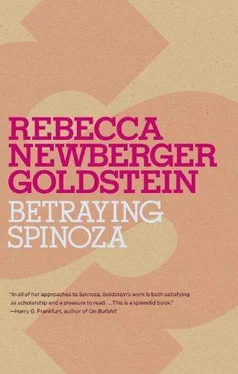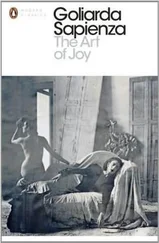Rebecca Goldstein - Betraying Spinoza - The Renegade Jew Who Gave Us Modernity
Здесь есть возможность читать онлайн «Rebecca Goldstein - Betraying Spinoza - The Renegade Jew Who Gave Us Modernity» весь текст электронной книги совершенно бесплатно (целиком полную версию без сокращений). В некоторых случаях можно слушать аудио, скачать через торрент в формате fb2 и присутствует краткое содержание. Год выпуска: 2009, ISBN: 2009, Издательство: Random House, Inc., Жанр: Биографии и Мемуары, на английском языке. Описание произведения, (предисловие) а так же отзывы посетителей доступны на портале библиотеки ЛибКат.
- Название:Betraying Spinoza: The Renegade Jew Who Gave Us Modernity
- Автор:
- Издательство:Random House, Inc.
- Жанр:
- Год:2009
- ISBN:978-0-80524273-7
- Рейтинг книги:5 / 5. Голосов: 1
-
Избранное:Добавить в избранное
- Отзывы:
-
Ваша оценка:
- 100
- 1
- 2
- 3
- 4
- 5
Betraying Spinoza: The Renegade Jew Who Gave Us Modernity: краткое содержание, описание и аннотация
Предлагаем к чтению аннотацию, описание, краткое содержание или предисловие (зависит от того, что написал сам автор книги «Betraying Spinoza: The Renegade Jew Who Gave Us Modernity»). Если вы не нашли необходимую информацию о книге — напишите в комментариях, мы постараемся отыскать её.
Betraying Spinoza: The Renegade Jew Who Gave Us Modernity — читать онлайн бесплатно полную книгу (весь текст) целиком
Ниже представлен текст книги, разбитый по страницам. Система сохранения места последней прочитанной страницы, позволяет с удобством читать онлайн бесплатно книгу «Betraying Spinoza: The Renegade Jew Who Gave Us Modernity», без необходимости каждый раз заново искать на чём Вы остановились. Поставьте закладку, и сможете в любой момент перейти на страницу, на которой закончили чтение.
Интервал:
Закладка:
This is how it often is, girls — that the vilest accusations against the Jews come from irreligious Jews themselves. It is as if, betraying the special task of holiness that Ha-Shem bestowed on the Jewish people, they must go to the opposite extreme, become leaders of godlessness among men.
I don’t have to remind you girls that Karl Marx was Jewish.
Spinoza refused to defend himself against his accusers. He said only that he was sorry for everyone there who had chosen to judge him so hastily and so harshly. Rabbi Morteira, informed of how his former prize student was accounting for himself at the synagogue, now rushed there and confronted the apikorus himself. He asked Spinoza whether this was to be the fruit of all the pains that he, his former teacher, had taken with his education, and whether he wasn’t afraid of falling into the hands of the living God? The scandal was great, but there was still time to repent. But if there was to be no sign of contrition, then the community would have no choice but to excommunicate him.
And do you know, girls, how this so-called philosopher, whom the world has decided to call great, answered his former rebbe, how he threw off his derekh eretz together with all else that he had been taught? He answered his teacher that he understood very well the seriousness of the charges against him and the nature of the threats that were hanging over his head, and in return for the trouble Rabbi Morteira had taken to teach him the Hebrew language, he, Spinoza, was quite willing to show him the proper method of excommunicating someone.
When Rabbi Morteira heard the way this young man spoke to him, with so much chutzpa, he dismissed everyone and left the synagogue. He saw that he had been completely mistaken in who this young man was. Before, he had told people that he was as impressed with Spinoza’s character as with his mind, 7that it was rare that one so brilliant would also be so modest. But now he saw that the situation was exactly the reverse. Baruch Spinoza was a monster of arrogance. There was no way of reasoning with this young man, as brilliant as he no doubt was.
Human intelligence is the greatest gift that Ha-Shem gave to human beings, making us closer to the malakhim —the angels — than to the beasts of the field. But if we forget from Whom we got this divine gift, if we begin to believe that we are somehow the source of our own intelligence and that we are capable of figuring out everything for ourselves without relying on the Torah, then we fall even below the animals. This is why all philosophy is apikorsus . The very word apikorsus , girls, comes from the name of a Greek philosopher, someone who was called Epicurus, who believed that pleasure is all that people have to live for.
After this confrontation in the synagogue, Spinoza moved away from the community, taking rooms with a non-Jewish friend of his outside of Amsterdam. He had already, for some time now, been mixing with non-Jews, preferring them to his own people. He had been studying Latin with a former priest who had also become a heretic in his own religion, by the name of Franciscus van den Enden.
In fact, there are some who say that Baruch tried to marry van den Enden’s daughter but that she rejected him for another student of her father’s who wasn’t going to become an impoverished philosopher, like Spinoza, but rather a doctor. Some say that this young man gave the young lady in question a pearl necklace and that is what finally decided her. Whether it’s true or not that he had tried to marry this non-Jewish girl, Spinoza never did marry, and in fact it seems that he never again tried to.
He lived alone, very simply, supporting himself by grinding lenses for telescopes and other optical instruments, and writing his blasphemous works. He had a small group of friends with whom he discussed his ideas. These were all Christians, although renegades among the Christians. Once he moved away from his old home, he had nothing more to do with Jews, nor with his old yeshiva friends, or even with his family. Because of the kherem , which in his case was permanent, no Jews were allowed to speak with him for the rest of his life, so he really had no choice here.
He had been studying Latin, girls, because in those days all the goyisha scholars wrote in Latin. If Baruch wanted to reject his rabbayim and study apikorsus , then he would have to learn Latin. He was particularly interested in studying the works of René Descartes, who was a French-Catholic philosopher whom many of the so-called freethinkers in Europe were excited about.
Descartes believed that there is a God, but he had still made the Catholic Church angry enough to put him onto its list of banned writers, called the Index. 8The reason he was considered dangerous to the Catholics was that he had written that people should not believe in God unless they can prove His existence according to the strictest rules of logic. If there are errors in the proofs for God’s existence, then the believer should no longer believe. In other words, Descartes taught that there is no room for emunah , for faith.
Spinoza agreed with this heresy of Descartes, only he, the Jew, went much further. Unlike Descartes, Spinoza would go on and argue for atheism, saying that the God that we can prove is nothing over and above nature, which, of course, girls, isn’t God at all, not for the Christians and not for the Jews. For no one. Spinoza wasn’t fooling anyone by playing around with words, saying that he believed in God, only making God be nothing more than nature, which of course everybody believes in. Who doesn’t believe in nature, since it’s what we see all around us? Really, girls, when you think about it, it’s ridiculous.
It was ridiculous, at least the way that Mrs. Schoenfeld had presented it — which is why I found myself wondering whether she was doing justice to Spinoza’s thoughts. Otherwise, why would the goyim proclaim him a great philosopher? I knew enough to know that the thinkers whom the world called great weren’t stupid.
But none of these ideas of his were yet known at the time of his excommunication, Mrs. Schoenfeld was explaining. All that the Amsterdam community knew was what the young men had reported about Spinoza’s views and the way that he had conducted himself in the synagogue when the accusations had been brought before him; they had heard for themselves the terrible way in which he had spoken to his former teacher, Rabbi Morteira.
And so the parnassim voted to put Spinoza into kherem . Others from the Amsterdam community had also been placed in kherem , sometimes for a day or two, sometimes for longer. It depended, of course, on the khayt (the transgression). This community of returnees, trying to find their way back to Judaism, relied on the kherem as a means of guidance. Sometimes it was a matter of not keeping the law the right way, of buying meat from an unauthorized butcher or cheating in business. Or if someone wrote a letter to a Marrano in Spain or Portugal that put the recipient into danger of being discovered by the Inquisition, then this, too, was grounds for excommunication.
Then, too, even before the famous Spinoza, there had been other heretical thinkers who had been placed in kherem because of their so-called philosophical ideas. There had been a very famous case, when Spinoza himself was a child, of a man named Uriel da Costa, who had been excommunicated. This da Costa had been born in Portugal into a family of converts from Judaism. His father was a very religious Catholic, and he himself had become a minor church official. However, from reading the Torah he became convinced that Judaism is the true religion and he went to Amsterdam to live as a Jew. But he wanted his Judaism to be based on the Torah alone; he didn’t accept any of the Talmud, any of the laws that derived from the Oral Law and from the rabbinical decisions. The way that he imagined Judaism, as a Christian back in Portugal, that’s the way he wanted it to be. You can see some of the difficulties that the rabbis of these former Marranos had to contend with. They had to be makhmir (strict) in order to impress on these sadly ignorant Jews the nature of halakha .
Читать дальшеИнтервал:
Закладка:
Похожие книги на «Betraying Spinoza: The Renegade Jew Who Gave Us Modernity»
Представляем Вашему вниманию похожие книги на «Betraying Spinoza: The Renegade Jew Who Gave Us Modernity» списком для выбора. Мы отобрали схожую по названию и смыслу литературу в надежде предоставить читателям больше вариантов отыскать новые, интересные, ещё непрочитанные произведения.
Обсуждение, отзывы о книге «Betraying Spinoza: The Renegade Jew Who Gave Us Modernity» и просто собственные мнения читателей. Оставьте ваши комментарии, напишите, что Вы думаете о произведении, его смысле или главных героях. Укажите что конкретно понравилось, а что нет, и почему Вы так считаете.












